Armitage upstage
I’m usually not organized enough to do Guy Day Friday. (That “Legenda” has appeared on Saturday afternoons for so long is kind of astounding, I always think, but it will probably change again when the school year ends and my schedule rearranges itself.) But there are a few more hours.
This is coincidental, but. I was rewatching Robin Hood 2.2 this week and found myself capping compulsively. Searching the blog, I thought that I had discussed this moment in detail before, but it turns out that I didn’t. I referred to it once, on a day when I didn’t have time to write about it. But there’s an inherent issue of interest involved to me — which is how Armitage’s rather baroque gestural performance in Robin Hood dances, as I put it so long ago, on tightrope between pantomime and life lesson. That’s something I’ve been wanting to write about forever, and this is not that post, but I hope it’s a piece of it.
In Robin Hood 2.2, “The Booby and the Beast,” the main plot circulates around the attempts of the gang to get at the Sheriff’s treasure, which is booby-trapped in his strong room, with the help of one of its designers, Stephan, who tells them about the traps they will face. The secondary plot, however, which intertwines with this insofar as it concerns the money in the strong room in the first place, concerns the Sheriff’s invitation to Count Frederick (Dexter Fletcher), to come and gamble in Nottingham, and the plan to fleece Frederick of some of his riches. The Sheriff orders Marian to do everything she can to appear alluring to Frederick and get him to gamble. When Frederick discovers the Sheriff’s plan to cheat him, however, he allies with Marilyn and after some thrills and chills as the boys deal with the booby traps in the strong room, all’s well that ends well, with a big donation to the poor.
In Armitage World, the episode is possibly better known for Marian’s faked attempt to reconcile with Guy of Gisborne (who’s just burnt down her house at Knighton in episode 1 of this series), which generated this lovely thumb shot.
 Marian (Lucy Griffiths) tries to distract Guy of Gisborne (Richard Armitage) in episode 2.2. of Robin Hood. Source: RichardArmitageNet.com
Marian (Lucy Griffiths) tries to distract Guy of Gisborne (Richard Armitage) in episode 2.2. of Robin Hood. Source: RichardArmitageNet.com
***
This episode opens with a really intriguing moment — and one that Armitage has said at least once was one of the most difficult sorts of scenes for him to play, when the Sheriff is directly humiliating him. (The whole question of portrayals of humiliation as tools in Armitage’s arsenal is one that I’ve already written something like ten thousand words on. Sigh. The Summer! The Summer!). It’s the “bath scene,” where Guy is forced to turn to face the naked Sheriff as he’s rising from his bath. The discussion in that scene of the plan and how it’s to be executed is thus held against a personally humiliating experience for Guy that sets the stage for what will happen later in the episode. The Sheriff is someone who plays such a role in Guy’s life that he can force Guy to look at his genitals. It’s an informal interaction here, but given the anachronistic nature of the BBC Robin Hood, it’s interesting to note that this sort of activity is actually constituted as a crime in our own period — one reading of it is that the Sheriff is thus committing a sort of low-grade form of sexual assault on Guy. Given Guy’s general gender trouble, this is a particular rhetorically violent way for the script to make its point.
But I’m actually interested in talking tonight about one of the scenes in which Guy’s standing in the background, as at Frederick’s arrival in Nottingham, when Marian has appeared at the Sheriff’s orders in an enticing new gown and is supposed to welcome the visitor. Fortunately for her, she doesn’t have to try very hard, because Frederick apparently finds her attractive upon sight, despite her hesitance.
The scene begins for Guy with an expression that’s a combination of evaluation and strained concentration, as Frederick walks toward Marian.
 Marian (Lucy Griffiths) welcomes Count Frederick (Dexter Fletcher) to Nottingham as Guy of Gisborne (Richard Armitage) looks on, in Robin Hood 2.2. My cap.
Marian (Lucy Griffiths) welcomes Count Frederick (Dexter Fletcher) to Nottingham as Guy of Gisborne (Richard Armitage) looks on, in Robin Hood 2.2. My cap.
But Frederick’s opener is a hopelessly corny joke about how he’d have employed “wind horses” to get there faster had he known of Marian’s presence, and Guy can easily brush that off with a classic left eyebrow / eye roll move.
This is an expression more of dismissal than anything else. Guy isn’t really angry, he appears to be looking off into space, and his eyes actually flash to his own right briefly. “Must we have this?” is his question, but not with any real energy.
But Frederick does not give up, and Guy realizes he is not quite standing on the secure footing of superiority that he might initially have thought. He begins to look condescendingly but curiously at Marian, to see how seriously she will take these odd verbal excesses.
His eyes shift thus quite noticeably toward Marian, and as a viewer, we almost feel sorry for her, recalling the disgust with which Guy has looked at her in the scene in which she gets the orders to buy the dress.
 Marian (Lucy Griffiths) welcomes Count Frederick (Dexter Fletcher) to Nottingham as Guy of Gisborne (Richard Armitage) looks on, in Robin Hood 2.2. My cap.
Marian (Lucy Griffiths) welcomes Count Frederick (Dexter Fletcher) to Nottingham as Guy of Gisborne (Richard Armitage) looks on, in Robin Hood 2.2. My cap.
Despite the kitschiness of the approach, Guy does not like this, not one bit, even though he’s really on the outs with Marian, having taunted her just previously in the scene in which the Sheriff orders her to buy the dress, using his control of her father as the lever to guarantee her agreement. In the context of the wake of that interaction, then, Armitage provides Guy with a series of reactions and facial expressions that are just as, or more, interesting to watch than the actual dialogue between Frederick and Marian, or even Marian’s unenthusiastic response to Frederick’s blandishments.
Interpretively interesting — the cap above shows elements of what we might consider sadness in Guy’s face. Despair seems a notable feature of Armitage’s characterization of Gisborne, which he seems to signal at least occasionally with flat affect microexpressions. Here the move seems to shift toward a slightly different mood, with an inward look of sadness rather than enervation. But Armitage catches the core of the bully here — the enmity toward the (in this case planned) victim being driven as much by self-disgust as by any real cause. Guy hates Frederick, inter alia, because he hates himself.
From a baseline above, where his lips are still open, Guy develops a pronounced sneer. (And here I admit sheepishly that I started capping this scene because of a temporary preoccupation with Armitage’s lip movements. I find sometimes if I “take pictures of it” with my computer, the fascination will leave me alone for a time.) Gisborne is no longer looking into himself, but outwards, with scorn, towards Frederick.
And then, we get the vital third part of this interaction: the Sheriff (I’ll explain why I think this is so vital in a second.) We see that Gisborne’s reactions are not really directed at Frederick — who is apparently unconscious of them, either on purpose, or because he’s so transfixed by Marian, who continues to look at him with a mixture of doubt and puzzlement. That is, Gisborne is reacting to Frederick, but he’s providing these reactions for the benefit of the Sheriff. We see, above, the move in his face from scorn of Frederick, as his eyes move, toward estimation of something.
What he’s evaluating — and thus the person for whom he’s performing all of this — is the Sheriff. The beginning of the look toward the Sheriff is also tinged again with sadness around the corners of the eyes, but its continuation here involves a sort of judgment, the signaling of a “can you believe this?” to the Sheriff. Armitage thus ties Guy’s frustration with Marian and his reactions to that impasse with his relationship to the Sheriff, so that Guy performs his relationship with Marian (at this point, still: attraction, love, hurt, humiliation, generating self-disgust and thus heavy outward scorn) for the benefit of the Sheriff as a way of showing the Sheriff that despite his attention to Marian here, he’s still on side. Guy confirms for the Sheriff what the Sheriff wants to believe about Frederick: that he’s indeed a booby.
Guy continues to observe Frederick’s attempts. Frederick insists on dispensing with formality; and then we see the men struggling with his chest of coins. At this point, Guy takes on a greater level of confidence — he knows that Marian isn’t going to approve of gaming, and he’s on sure ground.
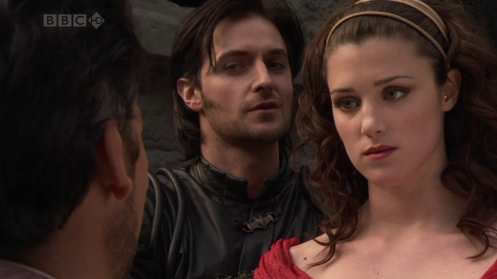 Count Frederick (Dexter Fletcher) begins a more intensive approach to capturing Marian (Lucy Griffiths)’s affections, as Guy of Gisborne (Richard Armitage) responds, in Robin Hood 2.2. My cap.
Count Frederick (Dexter Fletcher) begins a more intensive approach to capturing Marian (Lucy Griffiths)’s affections, as Guy of Gisborne (Richard Armitage) responds, in Robin Hood 2.2. My cap.
As anticipated, Marian admits that gaming is not entirely to her taste, and Guy watches Frederick to see how he will react.
Here, as we see in a series of facial moves, Guy is doing nothing so much as subtly preening over his own superiority…
With at first a smirk, almost amused, and …
… and then the speculative look inside himself again. This move is really interesting because it’s precisely the inward look above that signals Guy’s sadness and self-hate, so that as a viewer, one’s reactions here become multiple — on the one hand, Guy’s an arrogant jerk; on another, he can win this one, and if we like Guy at all at this point, or at least sympathize with him over being not just left, but slugged, at the altar only two episodes earlier, that, and his slight jubilation over it, might make us feel good. And it balances out the implied sad introspection of the earlier expression which makes the character seem more multivalent — this is someone who can experience a kind of joy (even if possibly in villainy), he can feel positive self-esteem, he is not someone who simply exploits victims out of negative emotion, but from a more complex series of motives. He knows he can be attractive to Marian. If he wants.
Finally, Guy is able to muster the same sort of strained concentration with which he began this encounter — but this time with a level of slight amusement — the expression here is still closer to smirk than to sneer.
However, it’s just at that point that Frederick decides to follow up and ask Marian what she likes to do, insisting that he will find things she enjoys. “Do you ride?” he asks, innocently, unaware of the gift that Guy gave Marian in series 1 at the Sheriff’s recommendation.
And Guy’s reaction is instantaneous. We see three variations on this expression in about half a second of footage. At first, it’s the “not this again” expression we saw above in response to Frederick’s corny “wind horses” statement.
But then, as Guy’s eyebrown moves marked higher, his look becomes slightly more introspective, and we see the immediate return of the internal disgust as well.
Guy appears to be making an internal calculation about this possibility, and his eyebrow falls again — as if he’s now decided.
And when he looks up again, what do we see? Who is Guy looking at?
Of course — the look back toward the Sheriff ends the scene. Guy once again ties his suffering to his reactions to Marian and simultaneously to his estimation of the Sheriff, to his performed willingness to decide for the Sheriff and not for Marian.
This is just a super scene. It’s interesting, watching it repeatedly, that my attention as viewer remains on the main action — the come-on conversation between Frederick and Marian — even as I notice Guy in the background. It’s clear that the director wants us to see all these emotions on Guy’s face, because he’d have shot it differently otherwise. But at the same time, Guy’s reaction never takes up more than fifty percent of the emotional space.
Note that Armitage is upstaging Fletcher here in the original, literal sense of a term — historical proscenium stages were guilt on a slight slope, so that an actor who moved toward the rear of the stage (this is why it’s called “moving upstage”) would remain equally visible, or even more visible, depending on perspective, to the audience. Armitage is simply standing a few steps higher than Fletcher, so that his facial reactions are clearly visible to the viewer, and constitute an important part of what the director wants the audience to see. And we can’t see Frederick’s face in much of the scene, and Marian’s face is relatively static, one supposes on purpose.
So why doesn’t he dominate the scene? We’re perfectly aware that Armitage is not immune to the desire to mug for attention — and getting it. I’m thinking of the cooking segment of this interview, for instance, where at least twice he looks calculatingly out at the audience to see if anyone’s watching him.
 Richard Armitage and Richard the cook, interviewed by Myleene Klaas on Lorraine, September 17, 2010. Source: RichardArmitageNet.com
Richard Armitage and Richard the cook, interviewed by Myleene Klaas on Lorraine, September 17, 2010. Source: RichardArmitageNet.com
And we can also argue that that’s part of his role in that particular setting — on a talk show, a little bit of upstaging is encouraged to keep up the energy.
But why doesn’t Armitage’s reaction in the scene above (and in the later casino scenes) ever move into that realm? Because upstaging is performing for the audience. Here, Armitage always remains in the scene. In this scene, Guy’s performance is constituted as a way of showing us his feelings, and as reaction to the two power poles of his universe — Marian and the Sheriff. In particular, many of his facial expressions are put together specifically for the Sheriff, since Marian can’t see him, and Frederick is either consciously or unconsciously ignoring him. The scene thus becomes an effective way to exemplify exactly where Guy’s political and personal loyalties lie — even as his gestures indicate to us that he is more than torn, and more than angry at himself for feeling torn.
So think of the catalog of things hinted at by these background expressions: Guy’s humiliation by / subordination to the Sheriff; his humiliation by / attraction to / evaluation of Marian; his performance of attention and attempt to display his own status, perceived or wished; his rather obviously put-on feigned boredom in response to Frederick; his inward self-disgust; his own capacity to feel humor or at least a tiny bit of superiority; his calculation of which side he’s going to take; and his evaluation of whether his performance in that regard, toward the Sheriff, is working.
Wow, Mr. Armitage.
I’d like to say something about the way that Armitage’s expressions navigate and move the relative status of the interlocutors around in this scene as well — the key thing being that the high status figure in the scene is the one we see least — the Sheriff — and although Guy keeps the physically highest position, he actually loses status repeatedly, falling to the lowest position — and Armitage’s performance constantly reminds the viewer of that — but I’m about to get kicked out of my café. Maybe tomorrow, or another time.
It’s probably Saturday now for many of my riders. But I think it was worth it, nonetheless.









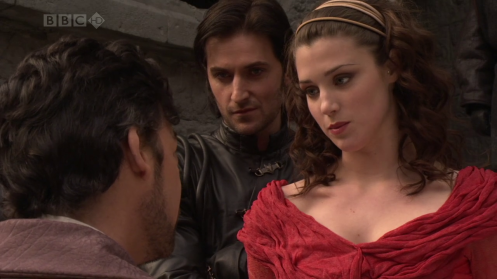
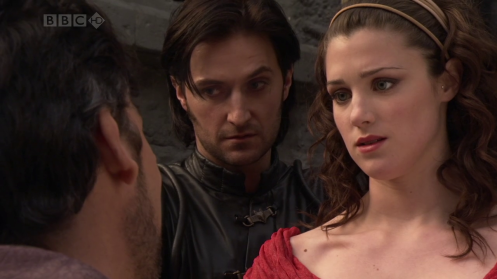
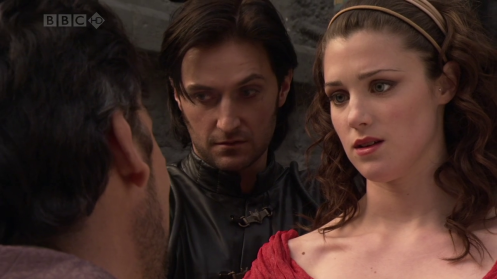
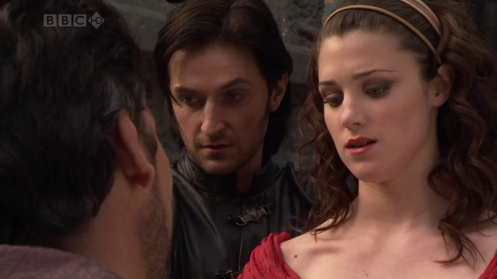




It was worth it for me! 😀 I love how much Guy can tell us without speaking a word. That is one of my favorite scenes in S2. Such a myriad of emotions crossing that face. And what a complex and fascinating character the “evil henchman” became in RA’s hands. What a Gisborne he gave us! And what a great analysis you gave us, dear prof.
Happy Guyday Friday and have a good weekend, Serv. 😀
LikeLike
One assumes he hadn’t had a lot of opportunity to actually express his feelings, so he had to find an outlet 🙂
LikeLike
One of the reasons that I fell for Guy was his ability to express so much with his face and not say a word. I started to watch Robin Hood on our PBS station when it came on in the Fall of 2010. I knew who Richard was at that time from YouTube but that was it. I had yet to figure out that I had seen him before. I had seen the last 2 or 3 shows from series 3 on BBCA and at the time didn’t know what to think, but when it came on from the start I decided to give it a chance. I am so glad I did. Not knowing that much about RA at that time Guy just worked his magic on me and I had to start to wonder why Marian did see Guy the same way. Idiot I thought why Robin, it’s Guy you want girl. After the first time I watched I really started to watch the Sheriff and his treatment of Guy, controlling of him and making Guy do things that maybe he thought was wrong but did out of humiliation.
LikeLike
In terms of what I’m aware of, the second biggest contingent of fans before TH “came in” via Guy. FedoraLady is an example 🙂
LikeLike
Impressive breakdown of his performance in this episode! I mostly remember it for his bare chest. 😉
LikeLike
which, it turns out, were in the ‘scenes for next week’ — see below 🙂
LikeLike
I love your piecing apart all the different scenes with Guy and Marian. As always your analysis is right on! However, your photo of Guy’s Beautiful torso and thumb is from the episode Childhood, S2 Ep. 3.
LikeLike
You’re right … I plead exhaustion and not having rewatched the whole episode and seeing the caps in the RichardArmitageNet.com gallery and not remembering that they were from the next episode. Will fix.
LikeLike
It’s amazing what you can take from a detailed look at just a minute scene within the larger episode. I have looked at that scene a few times, too, but in the shape of a gif on tumblr. At the time, I only felt amused by it – but your interpretation here now actually makes me admire RA’s acting.
I would be very curious to know how detailed the stage directions were for Guy. He is communicating a lot here – his own inner monologue as well as the silent communication with the Sheriff. By what degree was that intended by the director? I agree with you that the placement of Guy at the back of the two principal actors in the scene is intentional, of course. But I am inclined to think that Richard gave the director much more than he asked for, with his very own interpretation of his role and the internal workings of Guy’s mind. *That* for me is the sign of an excellent actor who knows his craft and who is actively taking part in the creating not only of the scene in question but in perpetuating the characterisation of Guy.
LikeLike
RA said in on of the hobbit interviews, that Peter Jackons’ direction was the first time he allowed himself to be lead. I interpreted that to mean he doesn’t need a lot of direction.
LikeLike
I saw that statement too and wondered what the *heck* he meant by it.
LikeLike
You and I need to start thinking about how to conceptualize certain kinds of watching, Guylty (or I want to). One reason that I don’t watch animated GIFs much is that they’re so dependent on whichever frame the Giffer is selecting. Their stop motion qualities make them fascinating to watch, but can give very different impressions of precisely the movements they seek to preserve than are recorded in the originals.
By this time we’re into series 2 — and I suspect that the way Armitage was being treated as an artist by the director had expanded a lot (in comparison, e.g. with series 1 and esp 1.1 where there are some similar moments). We know that he was making notes on scripts and talking to the writers after series 1, so his role in determining what would happen in a particular scene might potentially have been growing.
LikeLike
I like this episode very much, in large part because of Guy’s facial expressions in this scene, and others. Loved your breakdown of this scene.
LikeLike
Thanks!
LikeLike
I don’t know what this says about me, but I preferred Guy from the beginning. However the first time I saw him was in season 3. I think it’s because even though he was the bad “guy,” RA was able to layer the character so that you could see his pain and humiliation. Also the conflict between the person Marian wanted him to be vs what the Sheriff needed him to do vs the person he wanted to become. Have you written specifically about the Guy/Sherrif relationship…talk about layers. That would be fascinating to read.
LikeLike
I think Guy was a much more interesting character than the “hero.” When the series started, you could tell Sir Guy was written as a more one-dimensional baddie character. Richard with his talent and attention to detail, however, gave that layering, presented us with all the conflicts and complexities of this man. And the scriptwriters took note of what he was doing, NTM the response from the audience to this character, and we saw more screen time and story development for GoG.
Between what TPTB gave us scriptwise with Robin himself and (sorry, JA fans) the deficits in Armstrong’s acting, there was no contest as to which of the characters got and kept my attention, good looks and black leather aside. 😉
I think Serv has said before that Guy is really one of RA’s most complex characters, and I agree. The show may be dismissed as somewhat cartoonish and terribly anachronistic at times, but you can’t fault what the actor did with what he was given. (And it had its own cheesy charm–and the talents of other good actors.)
LikeLike
I saw Guy after Armitagemania hit, so I wasn’t an objective observer. However, I started out blogging about Guy from the perspective that the character was basically unlikeable at the beginning of series 1, and I got a huge (disgruntled) reaction from a Robin Hood fanboard. I was slightly sympathetic at the beginning, but apparently not enough.
I’m still trying to figure out how to write about this show in a way that honors its complication without drowning me in crazy amounts of analytical detail. Armitage doesn’t exactly make it easy.
LikeLike
Wow impressive analysis! 🙂
LikeLike
Thank you! 🙂
LikeLike
Servetus, what did you mean when you said “given Guy’s general gender trouble”? I’m not sure I follow that one.
LikeLike
I mean in the sense of Judith Butler, i.e., Guy experiences severe problems with gender performativity.
LikeLike
As usual, I watched all seasons/series with “tangenting” to other actors. Lucy G impressed me, and in the clips you showed above, I’m still impressed with her intuitive expressions. That said, your comments on the staging of Gisborne behind, (and somehow, with the camera work, becoming the cynosure) but above is striking. And while some actors do well with micro-expressions, Your analyses these last years go so far to explain the talent/expertise behind what some make of the pretty face of the actor. When it comes to trying to determine what is very good and disciplined acting training, and what it absolutely innate talent, based on the complete immersion in a character, I feel innate, honed by training and discipline. Complementary.
Even in some DVD extras and commentaries, the actors joked about suggestive gender attractions undertones to the characters.
LikeLike
yeah, although I don’t so much mean homoeroticism (which was clearly built into the series, with Guy undressing in front of Alan, for example) as the capacity to perform a gender role.
I think Lucy was great in this series but I don’t think she was required to do all too much in the scene above. Hers is the least important reaction, except as Guy perceives it, and that’s why his reaction to her has to be so visible (unless I’m reading the scene wrong). She’s the triple manipulee of the scene, at the mercy of each of the men in turn.
LikeLike
IMO one of the more interesting aspects of Guy’s character was the sexual ambiguity, but why do you say he had problems with performing a gender?
LikeLike
I think I’m going to table this response for a while — not because it doesn’t deserve one, but because the answer would get long if you aren’t familiar with Judith Butler’s work. I plan to write about this, never fear, and I’ll preface that with a discussion of what I mean. It was just a throwaway line in this post, and I probably should have left it out.
LikeLike
I’m not familiar with her work but looked on wiki and it sounds complicated. Looking forward to your post. tks.
LikeLike
Fantastic analysis! Thanks for (as always) deepening my appreciation of RA’s skill and attention to detail.
LikeLike
Thanks!
LikeLike
[…] unfairly because you are oversensitive to questioning around that fantasy. And finally, you write an analysis of a scene of Armitage’s work where all of the pressures on his character’s … — where Guy of Gisborne is forced into a self by others for whom he has to struggle to […]
LikeLike
Rush therapy, Armitage tangential | Me + Richard Armitage said this on May 2, 2013 at 4:58 am |
[…] called Guy’s “gender trouble.” The first time I said it, no one noticed, and the second time, two very astute readers said, “What do you […]
LikeLike
Richard Armitage, gender trouble, and status expertise | Me + Richard Armitage said this on July 29, 2013 at 6:30 am |
I have always marvelled at Richard’s ability to convey everything through his facial expressions. And this scene is a fine example of that. Brilliant analysis! 😀
LikeLike
Re-watched this not long ago and thoroughly enjoyed watching Guy throughout the conversation. Can’t believe It was the first time I noticed how Guy’s reactions were so central to the scene considering how absolutely mesmerizing RA was here. I don’t recall the connection to the sheriff though — thought it all was meant just for me, i.e. the audience.
LikeLike
in a way it is — i.e., you’re supposed to be observing the interaction he’s having — he’s not playing to the audience. But nonetheless you are there watching; so it’s really all for us, too.
LikeLike